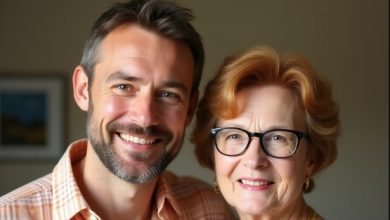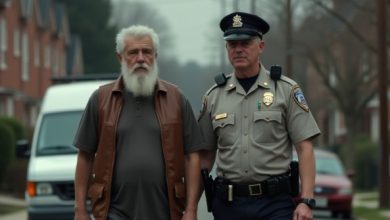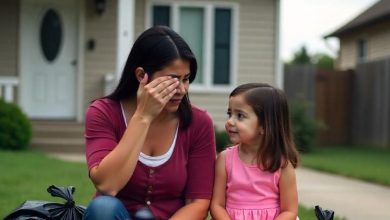My Husband Claimed the Credit for Everything I Did for the 4th of July Celebration — yet Karma Had Other Plans

Every summer I give my whole heart to the Fourth-of-July party, working for weeks so that the day feels bright and easy for everyone else. Year after year my husband, Joel, basks in the light while I stay behind the curtain. I used to tell myself that was fine, that somebody had to run the show from backstage. Then one thoughtless second turned our quiet suburb into a roaring mess, and the kind of truth you cannot ignore burned its way into the open. This season, the fireworks were not the only things ready to blow apart.
On Independence Day our house always turns into headquarters for Joel’s relatives. He likes to say that “we” host, but the only thing the two of us truly share is a last name on the mailbox. The real work is mine. I scrub bathrooms till the tile shines, change every sheet, wash the guest towels in extra-softener, and buy groceries for two dozen hungry people like I am feeding a football team. I iron tablecloths so stiff that they could stand by themselves. I place buntings on the porch, string fairy lights between trees, and sweep the walk so no one trips on gravel.
Joel’s part? He dislikes crowded stores. The smell of bleach makes him gag. He thinks that “fussing too much” ruins the mood, yet he craves a flawless party the way a child craves candy. One morning in early June he came thundering inside, cheeks red with excitement.
“This year will be special, Lee,” he told me, clapping his hands like a kid. “Miles is coming!”
Miles—his older brother—had not visited in five years. Unlike Joel, Miles kept his high-tech job, moved across state lines, and never looked back. Now he was traveling home, and Joel wanted everything bigger, louder, better.
“Let’s really go for it,” he urged me. “Don’t cut corners on decorations. Make that sangria you mix so well—Miles will flip for it!”
I nodded while slicing red apples into tiny star shapes meant for the punch bowl. A wild idea slipped into my mind: what if I simply did not do the work this time? Would Joel phone a caterer? Wipe the porch lights? Remember extra ice? No. He would panic first and blame me second. So, like always, I over-prepared because nobody else would.
I hand-painted banners, strung paper lanterns until my arms buzzed, and ordered biodegradable plates plus metal forks because Joel said plastic looked cheap. I rolled cloth napkins around sprigs of rosemary and tied them with twine, hoping someone might notice the scent. I scrubbed Joel’s faded flag-print apron until the red stripes bled faint pink, then ironed it twice so it would look crisp in pictures.
And Joel? He made ribs. Two racks. He soaked them in marinade the night before and bragged as though he had written a best-seller cookbook. They rested in a plastic bag on the fridge’s bottom shelf beside the pastries, pasta salad, garlic bread, and creamy coleslaw I had already finished.
The big day arrived, and the yard glittered like a magazine spread. The lawn looked freshly trimmed, paper lanterns danced in a light breeze, and cold sangria waited in clear glass pitchers. My pies glistened under brushed egg wash. From tiny speakers hidden in potted plants, soft jazz drifted through the air, though I knew teenagers would replace it with pop tracks soon enough.
Guests flowed through the gate: Joel’s parents, cousins, and their noisy kids. Laughter rolled like marbles across the grass. Then Miles and his wife Rhea appeared, polished as if they had walked off a winery billboard. Joel’s whole face lit up. Miles looked around, eyes wide.
“This place belongs on the cover of a lifestyle magazine, Leona,” Rhea whispered, touching my arm. For a heartbeat I felt seen—truly seen.
Then Joel tapped a fork against his glass to make a toast. “Glad everybody got here safe! Hope you’re loving the ribs—they’re what keep folks coming back, right?”
Polite chuckles floated through the yard. I cocked my head, thinking he was only nervous. But he went on. “Lee sets the atmosphere, sure—but the ribs are the star of the show.” He winked. Laughter boomed, good-natured but sharp in my ears, and I shrank inward.
Something inside me cracked—not loudly but deep, like a hidden seam in glass. I forced a practiced smile and slipped into the house. Down the hall and into the bathroom I went, locking the door, settling onto the closed toilet lid. I cried, not heaving sobs, just swift quiet tears that left my makeup almost intact. Even my grief had to stay neat.
I stared at the spotless sink and wondered when I stopped asking to be noticed. When did I become stage crew in my own life? I dabbed my eyes with the embroidered hand towel and murmured, “Smile and survive. That’s what you always do, Lee.”
The universe had other ideas. Barely four minutes after I turned the lock, the calm shattered. Shouts thundered through the house, feet pounded the floor, and Joel’s voice rose like a siren.
“Fire! FIRE!”
Heart racing, I ran to the back door and froze. The grill blazed like a small sun. Flames shot higher than my head, clawing at the patio roof. Thick black smoke curled upward, rolling over itself. Guests screamed; folding chairs crashed; a pitcher of lemonade splashed the grass. Joel, red-faced and frantic, wrestled a kinked garden hose with maybe half the water pressure he needed. His apron, once bright, flickered with little fires along the hem. The plastic side table sagged, half-melted, like a clock in a surreal painting.
Later I learned what happened. Joel had wanted to reheat a second rack of ribs fast, so he squirted extra lighter fluid onto coals already blazing. The grease inside the lid flashed, and the fire jumped. A cheap tarp overhead smoldered, threatening the brand-new umbrella. Miles, filming family introductions, captured the chaos on video. His voice on playback held equal parts fear and awe.
It took an hour—and three trips with buckets—to stamp everything out. Joel and his father soaked the grill, yanked down the ruined tarp, and scraped blackened bones from twisted metal. The ribs? Gone. The tablecloths? Singed. Joel’s grand moment? Reduced to smoke and rubble.
What did people finally eat? My sangria, pies, pasta salad with basil from the kitchen window box, sausage rolls, grilled chicken, buttery mashed potatoes. No one mentioned ribs again. They did not have to.
One by one, relatives found me. They did not just wave goodbye—they thanked me. Joel’s cousin hugged me tight. “You’re a magician, Lee. That chicken of yours? Unbelievable!” Her praise landed softly but stayed.
Rhea met me at the dessert table, where I refilled trays of star-shaped fruit. She spoke in a gentle low voice. “He is lucky you’re in his life,” she said—pure sincerity, no polite gloss.
“Luck can run out,” I answered, my throat tightening.
She touched my elbow. “Walk with me,” she suggested. We went to the small study no one else used—the one room still mine. Sunlight painted gold stripes across the rug. We sat, knees almost touching.
“This house is lovely,” she said, “but what you put inside—flavor, comfort, tiny touches—that’s the real wonder. That’s you, not Joel.” Her words shocked me with their simple truth. I realized how seldom anyone spoke to me directly, not as “helpful Leona” but as herself.
Rhea sighed. “I adore Miles, but if he ever dismissed me in front of family like Joel did? I’d have tossed him onto the flames right next to those ribs.” I laughed, a full-bodied laugh that rattled hidden walls inside me.
“You don’t owe Joel your invisibility,” she continued. “You deserve better than being the wizard behind the curtain while someone else takes the bow.” Tears threatened again, but this time they sprouted from relief, not hurt.
After a while she squeezed my hand and said, “Come back when you’re ready. I’ll block the small talk.” She left, and I breathed alone for a minute, feeling both hollowed and lighter.
Outside, Joel slumped on the porch, beer in hand, staring at the charred grill like it had betrayed him. The apron’s edges were stiff and brittle.
“Can’t believe the grill turned on me,” he muttered.
“Maybe it wanted credit too,” I replied, sipping my drink. He did not laugh, nor apologize—then or the next morning, when I cleaned melted plastic and ash without help. The smoky smell clung to the curtains. Joel hid in the den with video games, pretending nothing had happened.
A full week passed before he looked up from his phone and asked casually, “Want to skip hosting next year? Maybe Mom and Dad can try.” I glanced over my book and said yes—calmly, definitely. For the first time in years, I meant it.
I have a new plan. Next Fourth of July I will drive to the lake alone. I’ll pack a folding chair, a mason jar of chilled sangria, and maybe a pan of brownies if I feel generous. I will wear something light and airy so the breeze can play with my hair. I will cheer when the sky blooms in red, white, and gold. Then, when the last spark fades and smoke drifts over dark water, I will sit in that honest quiet.
Because this time I will know I did not scorch myself empty trying to make someone else shine. I will glow on my own terms, and that, I suspect, will be the most brilliant display of all.



